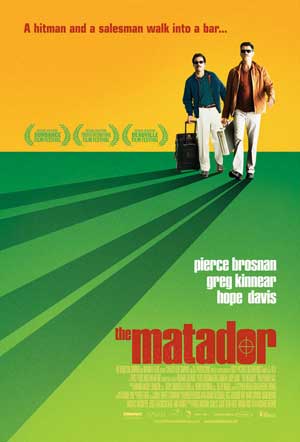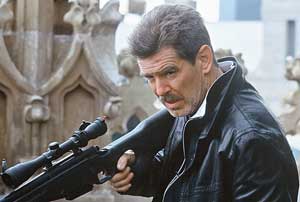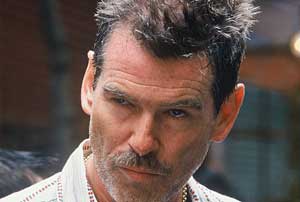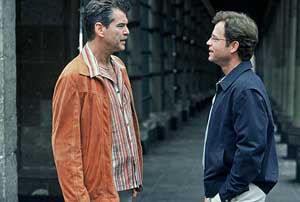 I walked into this interview with one goal – say ‘twat’ to Pierce Brosnan. It’s a low goal, sure, but every interview needs its focus.
I walked into this interview with one goal – say ‘twat’ to Pierce Brosnan. It’s a low goal, sure, but every interview needs its focus.
‘Twat’ didn’t just come out of nowhere. Brosnan’s character in The Matador is given to uttering words like that in some of the best, and dirtiest, lines of the year. He’s an aging hit man who is on the cusp of a nervous breakdown when he meets Greg Kinnear, a salesman in Mexico City trying to close a deal.
It’s a great film, funny and profane, and sure to shock fans of Brosnan (as he calls himself). He showed up with a big, pointy Van Dyke.
Q: Your facial hair is for a period piece?
Brosnan: This is for a movie I’m doing in Mexico with Liam Neeson. It’s a post-Civil War Western; I play a Yankee Captain, he plays a confederate. Therein hangs the tale
Q: Can you tell us what it was like to play a contract killer?
Brosnan: I love playing in this movie. Richard Shepard came bearing gifts. It happened at a very wonderful time in life; the script, the character, the performance. I thought it was wildly entertaining, and it was a good read. I never knew where the story was going to twist and turn. I thought we could go away and make a cool, slick, hip independent movie and get away with it, and so far, so good. I thought there were jokes in there which the audience would get in abundance because of my past performances – one in particular performance. Richard gave such a wonderful free flow jazz riff in his writing. He wrote it without any censorship.
Q: What drives you in your career…fear or desire?
Brosnan: Fear! Desire! Lust, ambition, money that’s what it’s all about. Tuesday is different than Thursdays. I have always had a strong healthy ambition and desire and certainly a passion for work. I love being an actor. I love everything I have ever done. Whether the audience liked it or not was sometimes painful, sometimes not. But I just love being an actor, I love the life of acting and reading and literature. What drives me – to make good work to make good movies to play with the best people possible.
Q: What about in life?
Brosnan: To do things, have a good time. To live life to the fullest. To live many lives, and work hard.
Q: What was it about the script or this character that appealed to you?
Brosnan: It made me laugh and it surprised me. It had humanity and a certain sincerity to it. It was twisted and dark, and doing dark comedies are not easy, because you’re always pushing the audience away and then bringing them in and then pushing them away and bringing them in. Sometimes, you can leave them out there hanging, and then you’ve lost them. The relationship Richard wrote with Danny and Bean was so idyllic, sweet, loving and tender and soulful and then juxtaposed between Julian’s vulgarian, twisted ways. I thought it was good drama,
Q: Speaking of twisted ways, how do you play Julian the way you do and keep the audience with you? There’s a line in particular in the film – ‘For all the teenage twat in Thailand’ – how do you say something like that and still keep us on your side?
Brosnan: I think you try and get them from the very beginning. Some fellow who wakes up with some broad in the bed–and audiences have seen Brosnan do that before. But you’re overweight, messed up, not sure if you’re having a heart attack or a seizure, then you paint your toenails. That dismantles everything from the get-go. He’s got an arrested development. Here’s a little boy he tells to ‘eff off’ and then taunts him with a nursery rhyme, ‘See you wouldn’t want to be you.’ You know this man is not quite all there, and you’re not sure what  he’s looking for. As an audience member, you’re not even sure if Brosnan is in the right movie or not, or in the right theatre. So, as an actor I know that theatrically there is kind of a push-me pull-me conflict.
he’s looking for. As an audience member, you’re not even sure if Brosnan is in the right movie or not, or in the right theatre. So, as an actor I know that theatrically there is kind of a push-me pull-me conflict.
I thought he was a charming character, and he had great vulnerability. The killing, schmilling, whatever, there is no violence. It’s sort of a man who is having a rough time, who happens to kill people.
Q: You’ve sort of owned the role of being the smooth ladies’ man. What draws you back to these roles again and again?
Brosnan: I get to live a normal happy life with a wife and children, and then I get to go out to the world and live it in the movies. My first encounter with the movies is well-documented. Bonnie and Clyde was one of the films. I suppose I dreamt of being a movie star, before I became an actor. It was an amazing escapism for me–love, romance, getting the girl.
Q: Do you have any interesting anecdotes from your time spent in Mexico?
Brosnan: There was such trepidation on going down there, because it has been painted in colors of violence and kidnapping. There is an underbelly of civilization that is desperate and poor. I came away with the art. I came away with the painters and the work I saw down there. I set up my own studio because I paint—I started as an artist of some sort, and I still continue that.
We had bodyguards, that’s for sure, and armored vehicles. That was a strange thing to be under, but it was a fabulous experience, and the overall package was just great. It was a small community of actors, a small company, and we were all passionate for it. The Mexican crew embraced us, and we embraced them back.
Q: Had you ever seen a bullfight before doing this movie?
Brosnan: Never have. I didn’t see a bullfight in this film either.
Q: What are the kinds of projects that attract you?
Brosnan: I like projects that have some kind of humanity and some kind of emotional content that makes me laugh, makes me cry, makes me want to turn the page. Desmond Doyle of Evelyn, Julian Noble of Matador, two different films, but same film really, because I have a certain heartbeat to them, religion to them, faith in them, one man who is fighting for his kids and this is a man who is brotherless, lost and looking for life, looking for love. Sometimes I haven’t had the confidence of the material or the relaxation of the performance and it becomes wobbly, but when you have good text and good actors, you just try to play with truthfulness and play with heart. But I think if you can do it without words in cinema, that’s the best.
Q: And you’ll also be playing an evil killer in Butterfly on a Wheel. How is that different from this role?
Brosnan: Now that I have opened the lid on playing this kind of role, there is no going back, but there’s no reason why I can’t go off and try and do Thomas Crown 2. I wanted to play as many things as possible. It just depends on how good the script is and how good you are in your performance.
Q: How do you go from Bond to focusing on your craft as an actor?
Brosnan: I always see actor first and foremost. I’m an actor, that’s my job. Movie star, I certainly wanted to be a part of that echelon of actors, I certainly wanted to play a movie star . I’ve played movie star and now I want to go back to being an actor. I have always been an actor. It’s giving a performance and this film allowed me to give a performance. It came at just the right moment in life.
been an actor. It’s giving a performance and this film allowed me to give a performance. It came at just the right moment in life.
Q: Is being a movie star a separate role? Do you ever feel pressed to be someone different for the press?
Brosnan: No. I try to be me all the time. I try to be me as much as possible.
Q: When and where are you happiest?
Jeff Wilser of ClubPlanet: Right now, I’m sure.
Brosnan: I said that without moving my lips.
Q: Was there any room for improvising as Julian?
Brosnan: Everything was in the script. Everything was there. The only line I ad libbed was the last line. I’ll never do that again. If the text is good, why ad lib?
Q: What was unique about Richard’s style of directing? If there was any.
Brosnan: There wasn’t really. Hope, Greg and I came to it because he put the roadmap down so well. We all saw the funny side; we saw the irony of it. [Greg]’s telling me about his dead son and the tragedy, and margaritas and cocks and now we’re happy and now I’m going to tell him a dirty joke about a guy with a 15-inch schlong. So as actors, you know this is coming and you know that this is going to turn the audience around. I’m watching him give a great performance, a sincere performance. We couldn’t get through it a few times. Richard didn’t have to direct. It was very simple.
Q: By the way, what is the punch line to that joke?
Brosnan: Don’t know.
Q: Did you make one up?
Brosnan: No I didn’t. I should have. If I was Method Acting.
Q: Was that your favorite moment for this character?
Brosnan: He just had such an organic life. He became bigger than my wildest dreams. I love the house sequence, I love the third act, because it gets into a Joe Orton type world, a Hunter Thompson type world. I like the theatricality of that. It’s just the lines. "A Vietnamese girl I once knew had her legs blah blah blah…" It’s not a one-liner, it’s a paragraph. I’m just trying to pitch those lines.
Q: What do you think that Richard saw in you that would make him think of you for this role?
Brosnan: Richard sent us the text as a writing sample.
Q: But why did he think of you for the role?
Brosnan: I don’t think he did. He sent it to us at Irish Dreamtime [his production company]. It was literally sent as a writing sample. Richard wrote it as a riff. He sat down, two guys walk into a bar, one is a hit man, one is a salesman. He stopped, put it away, took it out six months later.
Q: Have you ever had such a strange encounter at a bar as the one Danny has with Julian?
Brosnan: I had one in Zagreb, when the war was going on. This man was a soldier. He was a hit man. He drank and he cried and he wept. He talked about the killings, He talked about being in Bosnia and taking people down. Men. Women. Children. He was just crying and weeping. This was his war, the Serbs, etc. It was a pretty heavy night.
Q: Did that help prepare you for this role at all? Brosnan: Not really. That was a deep tragedy; that was a deep reality. This is a heightened theatricality. I gave the script to friend in the LAPD, said I’d like to talk to a criminal psychotherapist. They read the script and gave me a breakdown of a psychopath. It related to my own intuition as an actor as to where I wanted to go, they gave me the foundation. Psychopaths are charming and the greatest actors of all.
Brosnan: Not really. That was a deep tragedy; that was a deep reality. This is a heightened theatricality. I gave the script to friend in the LAPD, said I’d like to talk to a criminal psychotherapist. They read the script and gave me a breakdown of a psychopath. It related to my own intuition as an actor as to where I wanted to go, they gave me the foundation. Psychopaths are charming and the greatest actors of all.
Q: Did you have any say in the casting of Greg Kinnear or Hope Davis?
Brosnan: When I read it, we had a play reading, as we do with our films – you get a bunch of actors, you have a play reading, you listen to it and record it. Hope was there from the beginning, she was Bean, and she said, ‘You gotta do this movie.’
Q: What are you working on next with your production company?
Brosnan: Butterfly on a Wheel, this thriller that we are going to try and do. It’s a three-hander, it’s a tight little piece. It’s a small drama, we’re going to shoot it in San Francisco. I have no idea of where it’s going. The third act is getting there. The we have a film called the True Confessions of Charlotte Doyle with Danny DeVito and Morgan Freeman. It actually came to me as an actor, Danny adapted the book. Beautiful book, it’s in the school curriculum. It’s a period piece in 1832. Danny wanted me for the role of captain and said do you want to produce it with me. I said yes. Hopefully, we will go off to New Zealand and make it.
Q: Do you think that if you weren’t an actor, you’d just be a painter?
Brosnan: I don’t think I could make a living at it, but I would be in the arts in some way or another. It’s just a hobby. I’m an enthusiastic painter. I like it. I think about when all this goes away just sitting out there in Hawaii, painting away.
Q: So how is it working with Liam Neeson?
Brosnan: We’re having the time of our lives. A couple of Irishman, a couple of Paddies riding horses, wearing boots and guns. It’s a movie called Seraphim Falls, it’s by a young writer and director named David Von Ancken.
Q: What do you think of Daniel Craig as Bond?
Brosnan: I think he’s a fantastic actor. I wish him well. It’s a new chapter for Bond and it’s a new chapter for Brosnan.